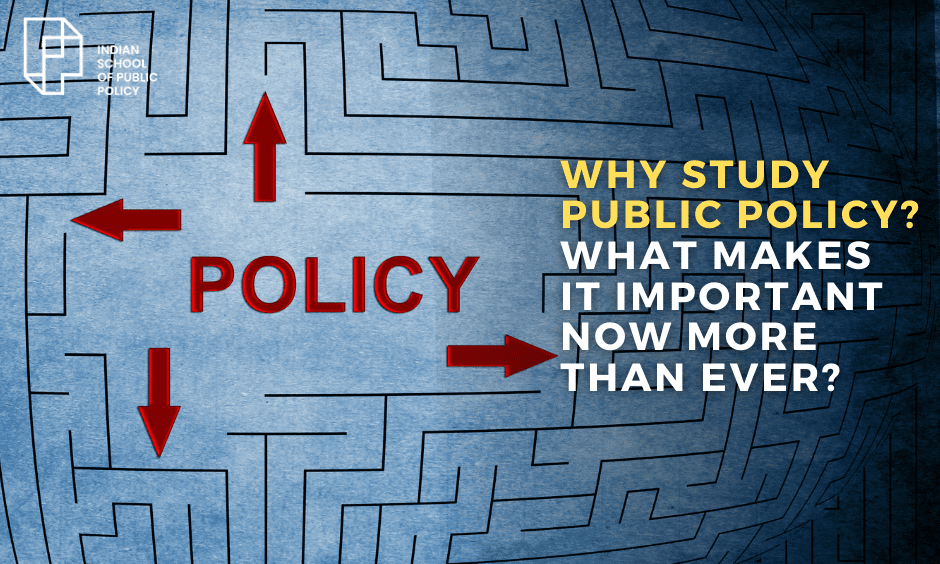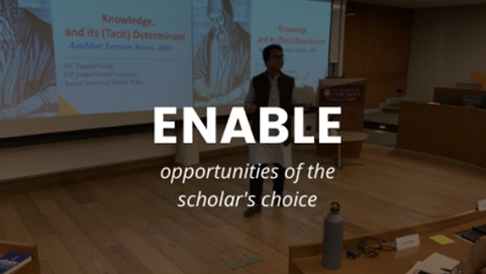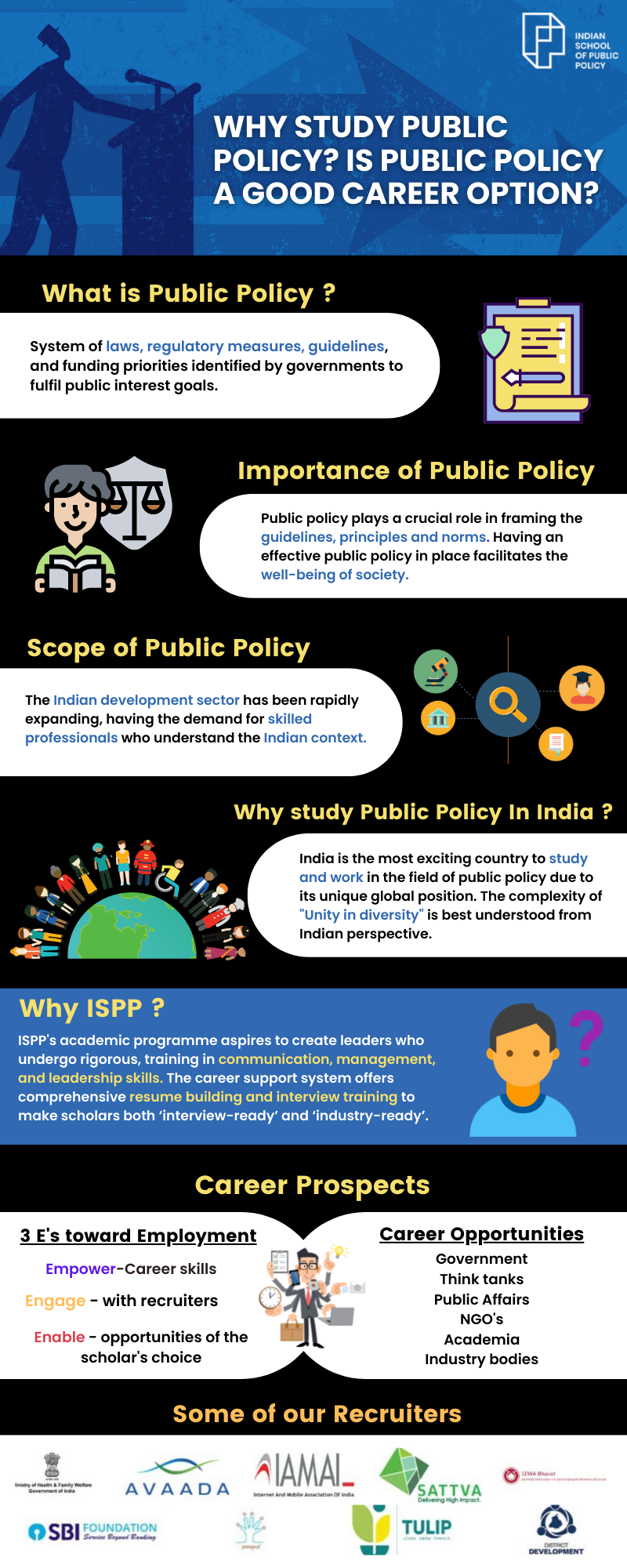
What is Public Policy? What Makes It Important Now More Than Ever?

What is Public Policy? | The History & Evolution of Public Policy | Features & Nature of Public Policy | Types of Public Policy | Process of Public Policy Formation | The Importance of Public Policy | Good Public Policies Important Now More Than Ever? | Why study Public Policy in India? | Scope of studying Public Policy | MPP vs PDM | PDM by ISPP | Major subjects in Public Policy | Perks of ISPP | 3 E’s of employment | Career opportunities | Placements | Recruiters | Testimonials | FAQs
What is Public Policy?
Public policy is a system of laws, regulatory measures, guidelines, and funding priorities identified by governments or their representatives to fulfil public interest goals.
From its inception to evaluation, any Public Policy evolves through an iterative process. Since this process involves mobilising many actors and resources, the resulting Public Policy is always an outcome of negotiating across competing interests and choices. This also means that Public Policies are constantly evolving.
Speaking of evolution, let’s learn a little about the history and evolution of Public Policy.
The history and evolution of Public Policy
Public policies have been integral to the governance structure of countries over centuries. In India, the roots of policy formulation date back to the ancient universities of Nalanda and Vaishali. During the reign of Chandragupta Maurya, Chanakya, a renowned scholar, outlined state policies in his seminal work “Arthashastra“.
Ashoka the Great further emphasised peace and harmony through his policies, transitioning from an era of constant warfare. Subsequent rulers like Akbar introduced significant reforms, demonstrating the evolving nature of policy frameworks.
Post-independence, India faced numerous challenges, necessitating robust policy frameworks to address economic, social, and cultural disparities and propel national development.
The features and nature of Public Policy
Public policy serves as a strategic framework for addressing societal issues across social, economic, and political domains. It encompasses a range of policies and decision-making processes aimed at achieving specific objectives. Key features of Public Policy include –
- Purposefulness, as it targets identified challenges like economic growth or environmental sustainability.
- Moreover, it operates systematically, involving coordinated efforts and various stakeholders.
- Public policy is strategic, prioritising long-term goals over short-term gains and necessitating careful consideration of potential impacts and resource allocations.
Types of Public Policy
The government’s strategic initiatives span diverse sectors, ensuring balanced and inclusive development:
| Economic Policy | Focuses on stimulating economic growth and inclusivity through strategies like Five-Year Plans and ‘Make in India,’ prioritising industrialisation, infrastructure expansion, and foreign investment. |
| Social Policy | Addresses healthcare, education, gender equality, and social well-being through initiatives like NRHM, SSA, and MGNREGA, aiming to bridge social disparities. |
| Environmental Policy | Strives to balance economic development with ecological sustainability via programmes like NCAP and NAPCC, emphasising environmental preservation. |
| Education Policy | Shapes the future of India’s youth with NEP 2020, promoting holistic learning, research, innovation, and improved access to quality education. |
| Healthcare Policy | Recognises access to quality healthcare as a fundamental right, with policies like Ayushman Bharat and NHM focusing on affordable healthcare services and enhanced infrastructure. |
The process of Public Policy formation
Conceptually, the life-cycle of a Public Policy involves six stages –
- Agenda-setting: In this stage, needs and priorities are identified. Multiple actors outside the government may also be involved in presenting issues or plans of action that require attention. At this stage, the policy problem to be addressed is defined.
- Policy formulation: A policy intervention gets structured at this stage, including planning out implementation logistics. Civil servants are crucial to drafting policy plans. Domain experts from non-government sectors may be consulted for shaping policies.
- Policy adoption: The policy may require regulations or legislation to be passed so Parliamentarians get involved. If it is a national policy, state governments are required to prepare the state machinery to implement the new Public Policy.
- Implementation: Policy implementation and monitoring require clear coordination across government and non-government agencies. Media channels may be used to inform citizens of the new policy and programmes that are created to implement the policy.
- Evaluation: Regular assessments follow the implementation stage to see whether policy objectives are met. Evaluations are conducted by government agencies and external actors, such as donor agencies and research firms.
- Policy maintenance: Any changes to the policy based on its performance are made at this stage
Importance of Public Policy
There are multiple stakeholders involved in formulating a Public Policy that spans the Sarkar (government), Bazaar (market), and Samaj (society). The three branches of the government – the legislature (Parliament), the executive (government and its Council of Ministers), and the judiciary (Supreme Court) are the main architects of Public Policies in India.
In India, state governments play a significant role in planning and implementing Public Policies through programmes or schemes. Chief Ministers, other elected legislators, civil servants at all levels of the government, and domain experts (e.g., from health, education, and transport) contribute heavily at different stages of the policy cycle.
Large donor agencies that support programme implementation play an essential role in deciding where funds are allocated. Non-government stakeholders such as NGOs or Civil Society Organisations who support implementation and educate the public through advocacy campaigns also provide feedback on how well the policies and programmes are operating.
Opposition parties, advocacy groups, political unions, researchers, and journalists are also vital to policy shaping, evaluation, and maintenance. Furthermore, professionals from most walks of public life, including business leaders, lawyers, security analysts, consultants, government contractors, and professionals in industries such as telecommunications, finance, education, energy, and healthcare, all have something meaningful to contribute to and influence Public Policies.
Public policy influences important decisions, usually formed in response to a specific issue that interests the public and offers solutions to address the problem. Thus, the general public is also involved in determining the course of Public Policies in India. Since Public Policies are targeted at specific groups or the entire country’s population, feedback from citizens becomes crucial.
Why are good Public Policies important now more than ever?
Over the years, nations have become increasingly interdependent for economic, security, and public health reasons, to name a few. As humans and resources cross international boundaries, public issues are also becoming global. The recent COVID-19 pandemic is a classic example of countries depending on each other to keep their citizens safe. Thus, Public Policy challenges have become all the more complex and layered.
Moreover, rapid urbanisation, rise in education, and uptake of technology and telecommunications have meant citizens and other key non-government stakeholders in India have also become active participants in policy deliberations. Public demands combined with the increasing complexity of social issues mean the implications of poorly designed and implemented Public Policies could be devastating.
Being a democracy, Indian citizens possess an important means to participate indirectly in policymaking, and that is by voting. When you vote for a government in and out of power, you also vote for or against their proposed Public Policies. As parties and politicians change every few years, the positions and perspectives of the majority, and those in office, change too. However, while politicians can get voted out of power, Public Policies are difficult to end overnight. Thus, it is essential to leverage your vote mindfully so that you support the ones who seek to influence the policies that matter to you the most.
To conclude, each stakeholder perceives a social challenge differently and has incentives or stakes in participating in the policy cycle. Successfully navigating complex negotiations between stakeholder interests and policy objectives makes the difference between an effective or ineffective Public Policy. However, the ultimate test of a good Public Policy is whether citizens’ needs are being met while maintaining larger national interests.
Register your Interest to Study at ISPP
Why study Public Policy in India?
It is best to be immersed in the country where you want to make an impact. India is arguably the most exciting country to study and work in the field of Public Policy right now. In 2022, India became the fastest-growing economy in the world. While other countries faced threats of recession, India recorded consistent growth. At the same time, India continues to face uphill battles concerning poverty alleviation, rapid urbanisation, and slow improvements across health and education indicators.
These realities are increasingly reflected across Indian educational and training institutes where governance is taught. From focusing on public administration, there is an increasing shift towards teaching Public Policy. This is a direct consequence of the complex challenges facing policymakers and implementers. Moreover, in 2013, Corporate Social Responsibility compliance became mandatory, bringing corporations into closer contact with government agencies to help achieve Public Policy objectives. As a result, getting high-quality inputs at the right time from the right stakeholders to guide decision-making has become critical.
Which issues should be prioritised? Where should funds be channeled? Which solutions should be focused on? What are the most effective means to implement and monitor programmes? Answers to these questions come from various domain specialists who have a sound understanding of the country’s complex administrative and political architecture. Getting Public Policies right in India’s unique context is, therefore, both a daunting and exciting challenge to take on.
Scope of Studying Public Policy in India
The scope of Public Policy in India spans the sarkar (government), bazaar (market), and samaj (society). The Indian development sector has rapidly expanded in the last two decades. As a result, a spate of new educational institutes offering Public Policy courses, think tanks, implementation, monitoring, and evaluation agencies have sprung up. Currently, the demand for skilled professionals who understand the Indian context, the functioning of Public Policy and governance, and domain-specific technical knowledge outmatches the supply.
The career scope in Public Policy is vast, and new roles regularly evolve as needs become more specialised. Public policy careers can be carved in both the public and private sectors. Following are some of the popular career options in Public Policy:
- Sarkar (Government): Civil services, judicial services, military, police, regulatory services (e.g., banking and insurance), teachers, healthcare workers, social workers.
- Bazaar (Market): Policy researchers and analysts, market researchers, policy consultants and advisers, impact assessors, monitoring & evaluation experts, journalists, public relations professionals, lawyers.
- Samaaj (Society): Programme officers, policy advocates, philanthropists, politicians, legislative aides, policy analysts, political pollsters, campaign managers, communication experts, programme officers.
People from all academic disciplines can find their career footing in Public Policy. It is a myth that only students with a background in social sciences, particularly economics, sociology, political science, and public administration, can thrive in this space. The technical expertise offered by engineers, architects, urban and rural planners, and management professionals is highly sought after to solve complex challenges ranging from urban infrastructure development to creating carbon neutrality strategies! A good way to explore career options in Public Policy is to intern or pursue a fellowship with a government or non-government entity. Public policy courses in India teach students the theories and practices surrounding Public Policy.
Since crafting effective policies is an art! To become a proficient artist in this realm, you’ll need to acquire the essential knowledge and skills to create meaningful impacts.
Continue reading to learn about the two educational pathways you can consider!
Master’s in Public Policy (MPP) VS a Post Graduate Programme (PGP) in Public Policy
The Master’s in Public Policy (MPP) programme delves into government policies and their societal ramifications. It strives to offer a solid grounding in policy analysis, implementation, and assessment. Graduates often embark on careers in government, nonprofits, or international organisations.
Similarly, the Post Graduate Programme (PGP) in Public Policy in India hones students’ policy-making and implementation proficiencies, catering to those eyeing roles in diverse sectors engaged with Public Policy. The curriculum encompasses economics, political science, law, and more, accentuating analytical prowess and research methodologies. Upon completion, graduates are equipped to assess policy matters and devise evidence-based remedies. When selecting a programme, factors like admission criteria and career trajectories merit consideration.
PDM by ISPP
The Post Graduate Programme in Public Policy, Design, and Management offered by the Indian School of Public Policy (ISPP) is highly recommended to succeed in this space.
Major subjects in this Public Policy programme
ISPP, scholars cover a range of subjects, including –
- Design thinking
- Markets for development
- Critical thinking and reasoning
- Economics and statistics
- Ethics of Public Policy
- Understanding behaviour, apart from covering domain-specific subjects, such as –
- Public health
- Education, gender
- Technology.
What are the perks of enrolling at ISPP?
The Indian School of Public Policy aspires to create leaders who undergo rigorous, with training in communication, management, and leadership skills. The career support system offers comprehensive resume-building and interview training to make scholars both ‘interview-ready’ and ‘industry-ready’.
ISPP has a careers team that encourages scholars to explore prospective career pathways. The careers team is dedicated to enabling scholars to pursue career opportunities of their interest.
Three Es towards employment
The vibrant diversity of the Indian School of Public Policy’s cohort is reflected in their varied career aspirations.
The ‘Three Es towards Employment’ is its own career support process, to maximise the varied skill sets and domain expertise that the scholars offer, and enable them to pursue varied career opportunities.

- Interview Practice Exercises
- Industry Interviews
- Resume-Building Workshops
- Case Interview Sessions
- One-on-One Career Counselling
- Special Series on Career Development

- Tea and Policy Sessions
- Policy Hackathons
- Immersive Learning Projects (ILPs)
- Short-term Internships/Projects

- Assistance in Pursuing Higher Studies
- Placement Assistance
Immersive Learning Project
Immersive Learning Projects (ILPs) at ISPP are designed to provide scholars with real-time experience working on policy projects. Undertaken by the ISPP scholars, the ILP is a remotely monitored association with a partner organisation and is offered as a part of their curriculum. During the tenure of this programme, scholars are expected to work with firms on live projects and apply their knowledge of Public Policy to solve complex challenges faced by the partner organisation. Sehgal Foundation, NITI Aayog, NSDC, BCG, EY, Safewater Network, Chase India, GRAAM, and APCO Worldwide are some of the organisations that have participated in the Immersive Learning Programme.
Thematic Areas
- Malnutrition In India
- Mainstreaming Gender In WASH
- Skill Development
- Enabling Profitable Investment In India
- Policy Advocacy
Career opportunities after pursuing a Public Policy programme from ISPP
- Government
- Think Tanks
- Public Affairs
- NGOs
- Academia
- Industry Bodies
Scholar Placements
Sector-wise break-up of scholars placed from the Class of 2022.
Recruiters
The holistic academic curriculum and robust career support system for personal and professional growth gives ISPP scholars the opportunity to work with reputed organisations.

Testimonials

The ILP programme was a rich learning experience. It was an opportunity to not only connect theory with practice but also to work with a team of industry professionals who helped refine every step during the project. I am indeed grateful to ISPP for giving me this opportunity.
Arindam Upamanyu, Founding Class of 2020

The placement training was a very holistic one that prepared me for all stages of my selection process. Right from behavior interviews, technical rounds to salary negotiations all came in handy during my selection stage at Innovation mission Punjab.
Deeksha Tiwari, Founding Class of 2021

The resume and profile building activity by the placements team was a challenging process but in the end helped me highlight the key aspects of my experience and made me stand out. I believe this was an important factor in my landing a job.
Nikhil Kanakamedala, Founding Class of 2021

ISPP’s ILP was my first space to research live projects. As team coordinator, I ensured our consistent mentorship and encouraged interdisciplinary strategies for deliverables. The team’s time with the Boston Consulting Group awarded us gainful and necessary experiences.
Priyanka Mehta, Founding Class of 2020
FAQs
What is Public Policy?
Public policy comprises laws, regulations, and funding priorities aimed at achieving societal goals.
How does Public Policy evolve?
Public policy evolves through an iterative process involving various stakeholders and resource mobilisation.
What are the key features of Public Policy?
Purposefulness, systematic operation, and strategic focus on long-term goals characterise Public Policy.
What are the types of Public Policy?
Economic, social, environmental, educational, and healthcare policies are vital for balanced development.
What stages are involved in Public Policy formation?
Agenda-setting, formulation, adoption, implementation, evaluation, and maintenance constitute the policy life-cycle.
Why are good Public Policies important?
Good policies address societal challenges, engage diverse stakeholders, and meet citizens’ needs.
Why study Public Policy in India?
India offers a dynamic environment for policy study amidst rapid economic growth and complex challenges.
What career opportunities does Public Policy offer?
Public policy careers span government, private sector, and civil society, catering to diverse interests and expertise.
Check Infographic



